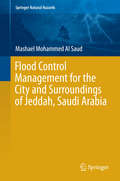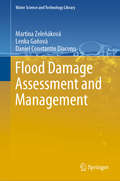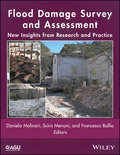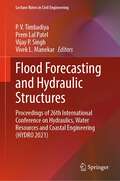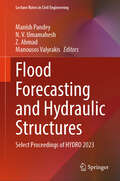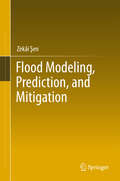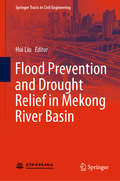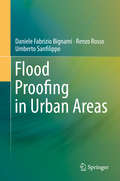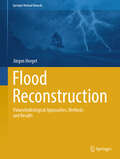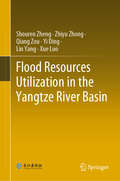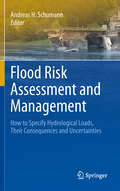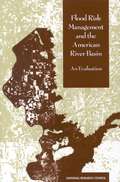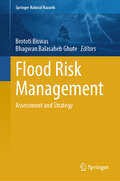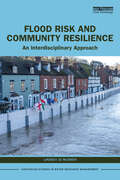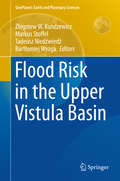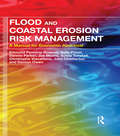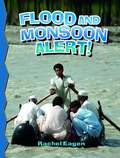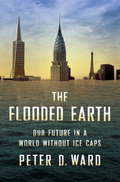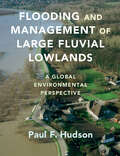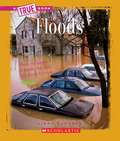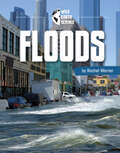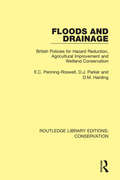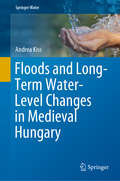- Table View
- List View
Flood Control Management for the City and Surroundings of Jeddah, Saudi Arabia
by Mashael Mohammed Al SaudDuring the past years, Saudi Arabia has been affected by particularly severe torrential rains and floods. This book presents an in-depth and all-encompassing study on the floods that occurred in the Jeddah area in 2009 and 2011, including water-flow mechanisms, state-of-the-art techniques for flood assessment, flood control and appropriate management approaches. It highlights a number of methods and concepts that can be applied in similar areas in Saudi Arabia in order to reduce and mitigate the impact of torrential rains and floods.
Flood Damage Assessment and Management (Water Science and Technology Library #94)
by Martina Zeleňáková Lenka Gaňová Daniel Constantin DiaconuThis book presents state-of-the-art, essential methods and tools for flood risk assessment and management. The costs of damage caused by extreme weather events, among which floods are a major category, are rapidly rising, both globally and across Europe. The scope and scale of flood episodes point to the need for comprehensive proposals, including the implementation of flood protection measures in areas exposed to flood risk. This book is dedicated to flood damage assessment, and addresses the management of social, economic and environmental damage. It develops a general methodology for flood risk assessment and presents a range of effective flood protection methods in keeping with the objectives of flood risk management. As such, it offers a valuable resource for young researchers, academics, lecturers and water management practitioners alike.
Flood Damage Survey and Assessment: New Insights from Research and Practice
by Scira Menoni Daniela Molinari Francesco BallioSeveral scholars across the globe identified the present lack of high quality damage data as the main constraint to efficient risk mitigation. The need for a systematic collection of damage data in the aftermath of flood events come into light, thus the aim being the creation of complete and reliable databases. Flood damage data collected in the aftermath of a disastrous event can support a variety of actions, which include: (i) the identification of priorities for intervention during emergencies, (ii) the creation of complete event scenarios on the basis of which understanding the fragilities of the flooded areas and tailoring risk mitigation strategies, (iii) the definition of victims compensation schemes, and (iv) the validation/definition of damage models to feed cost-benefit analysis of structural and non-structural mitigation actions (including insurance schemes). Volume highlights include: A good compilation of real world case studies elaborating on the survey experiences and best practices associated with flood damage data collection, storage and analysis, that can help strategize flood risk mitigation in an efficient manner Valuable contributions covering different flooding phenomena such as riverine and mountain floods, different spatial level of analysis from local to global scales, and different stakeholders perspectives, e.g. public decision makers, researchers, private companies Contributions from leading experts in the field, researchers and practitioners, including civil protection actors working at different spatial and administrative level, insurers and professionals working in the field of natural hazards mitigation Flood Damage Survey and Assessment: New Insights from Research and Practice will be a valuable resource to all earth scientists, hydrologists, meteorologists, geologists, geographers, civil engineers, insurers and policy decision makers.
Flood Forecasting and Hydraulic Structures: Proceedings of 26th International Conference on Hydraulics, Water Resources and Coastal Engineering (HYDRO 2021) (Lecture Notes in Civil Engineering #340)
by Vijay P. Singh P. V. Timbadiya Prem Lal Patel Vivek L. ManekarThis book comprises the proceedings of the 26th International Conference on Hydraulics, Water Resources and Coastal Engineering (HYDRO 2021) focusing on broad spectrum of emerging opportunities and challenges in the field of flood forecasting and hydraulic structures. It covers a range of topics, including, but not limited to, early warning system, urban flood modelling and management, dam hazard classification, river training and protection works, structural and non-structural measures for flood mitigation, assessment and development of flood vulnerability, hazard and risk maps rehabilitation of old dams, streamflow turbines, canal operation and related structure, operation and management of dams including their instrumentation etc.Presenting recent advances in the form of illustrations, tables, and text, it offers readers insights for their own research. In addition, the book addresses fundamental concepts and studies in the field of flood forecasting and hydraulic structures, making it a valuable resource for both beginners and researchers wanting to further their understanding of hydraulics, water resources and coastal engineering.
Flood Forecasting and Hydraulic Structures: Select Proceedings of HYDRO 2023 (Lecture Notes in Civil Engineering #546)
by Manish Pandey N. V. Umamahesh Z. Ahmad Manousos ValyrakisThis book presents the select proceedings of the 28th International Conference on Hydraulics, Water Resources, River and Coastal Engineering (HYDRO 2023) focusing on broad spectrum of emerging opportunities and challenges in the field of flood forecasting and hydraulic structures. It covers a range of topics, including early warning system, urban flood modelling and management, dam hazard classification, river training and protection works, and structural and non-structural measures for flood mitigation, assessment, and development of flood vulnerability. The book also presents latest developments in topics such as hazard and risk maps rehabilitation of old dams, streamflow turbines, canal operation and related structure, and operation and management of dams, including their instrumentation. Presenting recent advances in the form of illustrations, tables, and text, it offers readers insights for their own research. In addition, the book addresses fundamental concepts and studies in the field of flood forecasting and hydraulic structures, making it a valuable resource for both beginners and researchers wanting to further their understanding of hydraulics, water resources, and coastal engineering.
Flood Modeling, Prediction and Mitigation
by Zekâi ŞenThis book draws on the author’s professional experience and expertise in humid and arid regions to familiarize readers with the basic scientific philosophy and methods regarding floods and their impacts on human life and property. The basis of each model, algorithm and calculation methodology is presented, together with logical and analytical strategies. Global warming and climate change trends are addressed, while flood risk assessments, vulnerability, preventive and mitigation procedures are explained systematically, helping readers apply them in a rational and effective manner. Lastly, real-world project applications are highlighted in each section, ensuring readers grasp not only the theoretical aspects but also their concrete implementation.
Flood Prevention and Drought Relief in Mekong River Basin (Springer Tracts in Civil Engineering)
by Hui LiuThis book provides an overview of flood and drought in the Lower Mekong Basin, reviews the characteristics of flood and drought, and details structural and non-structural measures for flood and drought mitigation employed in the basin countries, as well as their flood and drought mitigation capacity. Given its scope, the book offers a valuable resource for researchers and engineers in the field of transboundary rivers, especially those with an interest in the Lower Mekong River.
Flood Proofing in Urban Areas
by Daniele Fabrizio Bignami Renzo Rosso Umberto SanfilippoFlood control in urban areas can be feasibly and cost-effectively enhanced by implementing flood proofing approaches to risk reduction in the context of environmental and land-use planning and management. Indeed, flood proofing makes it possible to improve, integrate and in some cases even replace traditional measures for flood control, reducing the vulnerability and increasing the resilience of buildings and infrastructures.This book begins by reviewing the physics of stability and instability of both human beings and buildings under flood conditions, together with criteria and models (both conventional and innovative) for assessing flood strains. In turn, it presents a range of flood proofing concepts and techniques, together with a complete and updated classification of related methods and devices. This provides a user-friendly tool to help identify appropriate solutions to real-world problems for each specific risk scenario.In particular, the book focuses on temporary flood proofing techniques, given their ability to deliver effective performance at low costs. Lastly, it features an overview of norms, guidelines and laboratory recommendations that are currently being adopted in various countries with regard to flood proofing devices and testing procedures.The purpose of this book is essentially to encourage authorities, stakeholders, technicians and end users to successfully develop flood proofing solutions that can reduce flood risk in a pragmatic manner. In addition, the authors hope to inspire researchers, manufacturers and designers (engineers, architects, urban planners and urban managers) to pursue further advances in this key sector of public and private safety in urban areas.
Flood Reconstruction: Palaeohydrological Approaches, Methods and Results (Springer Natural Hazards)
by Jürgen HergetFloods are among the most common and consequential natural disasters on Earth, occurring in all natural areas at all times. Yet, they often surprise us with their unexpected magnitude and the damage they cause. Terms like century and millennium floods quickly become widespread, but what do we really know about the floods of the past? How can we truly classify events like the Mississippi flood of 1993, the Elbe flood of 2002, or the Pakistan flood of 2010? Have such floods occurred before, or are they unprecedented, perhaps even consequences of ongoing climate change? To answer these questions, we must look into the past. However, river level records are often limited in duration, rarely extending back more than a hundred years, and many regions lack any measured values at all. Nonetheless, floods have left their marks. These marks may exist in the form of historical records and descriptions, which vary in extent across different cultural contexts. In addition to historical records, natural indicators like deposited sediments or erosion traces provide valuable information about past flood levels. This is particularly important for prehistoric periods and for regions without dense settlements and related gauges. These investigations lead to further questions about maximum flood levels and the earliest recorded observations. This book addresses these questions by exploring the reconstruction of floods from both historical and prehistoric times. It explains and discusses methods and results for beginners with diverse backgrounds in disciplines such as earth sciences, hydrology, history, and engineering. Extensive and carefully selected reference lists offer access to additional information.
Flood Resources Utilization in the Yangtze River Basin
by Yi Ding Lin Yang Shouren Zheng Zhiyu Zhong Qiang Zou Xue LuoThis book is highly informative and carefully presented, providing scientific insights into the flood resources utilization in the Yangtze River Basin both for scholars and decision-makers. The book is for the purpose of analyzing the potential utilization of flood resources in the Yangtze River Basin and exploring effective ways to put forward the countermeasures against the risks. Major objectives of this book include: (1) revealing the characteristics of the inflow and the sediment variation in the upper reaches of the Yangtze River, quantitatively evaluating the potential utilization of the flood resources in the Yangtze River and demonstrating the feasibility of its utilization in the Basin; (2) proposing the necessity and feasibility of utilizing the flood resources by the Three Gorges Project; (3) shedding new light on the characteristics of the flood resources, presenting different methods of flood resources utilization in different regions over the Basin and raising the overall risk-optimized strategies of the flood resources utilization in the Yangtze River; (4) analyzing the risk of flood resources utilization for the Three Gorges Project regarding flood control, sediment, ecology, etc., and putting forward the risk-optimized countermeasures of flood resources utilization for the Three Gorges Project.
Flood Risk Assessment and Management
by Andreas H. SchumannFlood catastrophes which happened world-wide have shown that it is not sufficient to characterize the hazard caused by the natural phenomenon "flood" with the well-known 3M-approach (measuring, mapping and modelling). Due to the recent shift in paradigms from a safety oriented approach to risk based planning it became necessary to consider the harmful impacts of hazards. The planning tasks changed from attempts to minimise hazards towards interventions to reduce exposure or susceptibility and nowadays to enhance the capacities to increase resilience. Scientific interest shifts more and more towards interdisciplinary approaches, which are needed to avoid disaster. This book deals with many aspects of flood risk management in a comprehensive way. As risks depend on hazard and vulnerabilities, not only geophysical tools for flood forecasting and planning are presented, but also socio-economic problems of flood management are discussed. Starting with precipitation and meteorological tools to its forecasting, hydrological models are described in their applications for operational flood forecasts, considering model uncertainties and their interactions with hydraulic and groundwater models. With regard to flood risk planning, regionalization aspects and the options to utilize historic floods are discussed. New hydrological tools for flood risk assessments for dams and reservoirs are presented. Problems and options to quantify socio-economic risks and how to consider them in multi-criteria assessments of flood risk planning are discussed. This book contributes to the contemporary efforts to reduce flood risk at the European scale. Using many real-world examples, it is useful for scientists and practitioners at different levels and with different interests.
Flood Risk Management and the American River Basin: An Evaluation
by Committee on Flood Control Alternatives in the American River BasinThis book reviews the U.S. Army Corps of Engineers' (USACE) investigations of flood control options for the American River basin and evaluates flood control feasibility studies for the watershed, with attention to the contingency assumptions, hydrologic methods, and other analyses supporting the flood control options.This book provides detailed comments on many technical issues, including a careful review of the 1991 National Research Council report American River Watershed Investigation, and looks beyond the Sacramento case to broader questions about the nation's approach to flood risk management. It discusses how to utilize information available about flood hazard reduction alternatives for the American River basin, the potential benefits provided by various alternatives, the impacts of alternatives on environmental resources and ecosystems, and the trade-offs inherent in any choice among alternatives which does not lie in the realm of scientists and engineers, but in the arena of public decisionmaking.
Flood Risk Management: Assessment and Strategy (Springer Natural Hazards)
by Brototi Biswas Bhagwan Balasaheb GhuteThis book examines the nature of flood in different landscapes and the various factors that contribute to flooding in different areas. It identifies flood risk zones in different terrain types and provides valuable insights into the anthropogenic, geographical, hydro-geological, and geomorphological aspects of flood-prone areas to achieve sustainable risk management. The book also explores the impact of avalanches, global warming, and flash floods in different settings where such types of flooding have become more common. In addition, the volume provides case studies to evaluate the impact of flooding in both natural and man-made environments. To better understand and manage floods, the book combines advanced geospatial tools and techniques with indigenous knowledge. Using machine learning and multiple-criteria decision analysis, the book provides an amalgamation of technology and indigenous knowledge to assess flood susceptibility. The book also includes strategies to manage flood risks and case studies that demonstrate best practices in flood risk management. The volume is a valuable resource for researchers, students, and policy makers to understand the causes of floods and their socio-economic impact in different areas.
Flood Risk and Community Resilience: An Interdisciplinary Approach (Earthscan Studies in Water Resource Management)
by Lindsey Jo McEwenThis book details the impact of flooding on our environment, and the ways in which communities, and those that work with them, can act to manage the associated risks.Flooding is an increasingly significant environmental hazard which inflicts major costs to the economies and livelihoods of developed countries. This book explores how local communities can identify, manage, and adapt to the ever-increasing damage flooding causes. Focusing on the future role of local communities, the benefits and challenges of their involvement, and the potential areas of transformation, this book provides insights into the efficacy of interdisciplinary and transdisciplinary working. Alongside research into similar environmental hazards, this book also draws upon the author’s own knowledge of flood risk management in distinctive non-contiguous interdisciplinary settings. The chapters draw together a different and distinctive set of interdisciplinary themes in flood risk management and social resilience. In doing so, it strives to communicate the different ways of thinking that can usefully contribute to flood risk management.This book would be ideal for those researching flood risk management, alongside scholars and non-scholars alike who are interested in finding ways of adapting to environmental hazards working with local communities.
Flood Risk in the Upper Vistula Basin
by Markus Stoffel Zbigniew W. Kundzewicz Tadeusz Niedźwiedź Bartłomiej WyżgaThis pioneering book addresses the entirety of river flooding issues in the Upper Vistula Basin, where considerable flood generation potential exists. It analyses the factors influencing flood risk, investigates variations in observation records and discusses projections for the future and adaptation to changing risk. It serves the general interest in understanding the floods that cause massive destruction in Europe, with dozens of fatalities and tremendous material damages. This interdisciplinary book, which covers aspects of climatology, geomorphology, hydrology, and water and flood risk management, unveils the complexity of the current situation. Access to reliable and accurate information can help solve important practical problems related to flood risk reduction strategies, and is at the core of the EU Floods Directive. As such, the book offers a valuable resource for scientists, educators and practitioners involved in water management, natural disaster reduction and adaptation to climate change.
Flood Warning (Let's-Read-and-Find-Out Science 2)
by Katharine KenahRead and find out about the different kinds of floods, how they start, and how to stay safe in this colorfully illustrated nonfiction picture book.You are lying in bed listening to the soft sound of rain. It has been coming down for hours. Now something is changing. The rain sounds harder and louder, and there is water running down the road, which looks like a small river. What is happening? You are hearing and seeing the start of a flood.With colorful illustrations and engaging text, Flood Warning is a fascinating look into a dangerous natural disaster. Featuring rich vocabulary bolded throughout the text, this book also includes a find out more section with instructions on how to make a rain gauge and an infographic about saving water at home. Both the text and the artwork were vetted for accuracy by Dr. Christopher Kenah, Geologist, Division of Drinking and Ground Waters, Ohio Environmental Protection Agency.This is a clear and appealing science book for early elementary age kids, both at home and in the classroom. It's a Level 2 Let's-Read-and-Find-Out, which means the book explores more challenging concepts for children in the primary grades. The 100+ titles in this leading nonfiction series are:hands-on and visualacclaimed and trustedgreat for classroomsTop 10 reasons to love LRFOs:Entertain and educate at the same timeHave appealing, child-centered topicsDevelopmentally appropriate for emerging readersFocused; answering questions instead of using survey approachEmploy engaging picture book quality illustrationsUse simple charts and graphics to improve visual literacy skillsFeature hands-on activities to engage young scientistsMeet national science education standardsWritten/illustrated by award-winning authors/illustrators & vetted by an expert in the fieldOver 130 titles in print, meeting a wide range of kids' scientific interestsBooks in this series support the Common Core Learning Standards, Next Generation Science Standards, and the Science, Technology, Engineering, and Math (STEM) standards. Let's-Read-and-Find-Out is the winner of the American Association for the Advancement of Science/Subaru Science Books & Films Prize for Outstanding Science Series.
Flood and Coastal Erosion Risk Management: A Manual for Economic Appraisal
by Edmund Penning-Rowsell Sally Priest Dennis Parker Joe Morris Sylvia Tunstall Christophe Viavattene John Chatterton Damon OwenA new ‘Multi-Coloured Manual' This book is a successor to and replacement for the highly respected manual and handbook on the benefits of flood and coastal risk management, produced by the Flood Hazard Research Centre at Middlesex University, UK, with support from Defra and the Environment Agency. It builds upon a previous book known as the "multi-coloured manual" (2005), which itself was a synthesis of the blue (1977), red (1987) and yellow manuals (1992). As such it expands and updates this work, to provide a manual of assessment techniques of flood risk management benefits, indirect benefits, and coastal erosion risk management benefits. It has three key aims. First it provides methods and data which can be used for the practical assessment of schemes and policies. Secondly it describes new research to update the data and improve techniques. Thirdly it explains the limitations and complications of Benefit-Cost Analysis, to guide decision-making on investment in river and coastal risk management schemes.
Flood and Monsoon Alert! (Disaster Alert!)
by Rachel EagenIn light of the devastating floods in 2010 in Pakistan, Brazil, the United States, and China, this informative book has been newly revised. Floods result from heavy rains and high winds that cause an overflow in water sources such as lakes, rivers, and oceans. Discover how monsoons differ from other storms and how people cope with their devastation.
Flooded Earth: Our Future In a World Without Ice Caps
by Peter D. WardSea level rise will happen no matter what we do. Even if we stopped all carbon dioxide emissions today, the seas would rise one meter by 2050 and three meters by 2100. This--not drought, species extinction, or excessive heat waves--will be the most catastrophic effect of global warming. And it won’t simply redraw our coastlines--agriculture, electrical and fiber optic systems, and shipping will be changed forever. As icebound regions melt, new sources of oil, gas, minerals, and arable land will be revealed, as will fierce geopolitical battles over who owns the rights to them. In The Flooded Earth, species extinction expert Peter Ward describes in intricate detail what our world will look like in 2050, 2100, 2300, and beyond--a blueprint for a foreseeable future. Ward also explains what politicians and policymakers around the world should be doing now to head off the worst consequences of an inevitable transformation.
Flooding and Management of Large Fluvial Lowlands: A Global Environmental Perspective
by Paul F. HudsonPressure on large fluvial lowlands has increased tremendously during the past twenty years because of flood control, urbanization, and increased dependence upon floodplains and deltas for food production. This book examines human impacts on lowland rivers, and discusses how these changes affect different types of riverine environments and flood processes. Surveying a global range of large rivers, it provides a primary focus on the lower Rhine River in the Netherlands and the Lower Mississippi River in Louisiana. A particular focus of the book is on geo-engineering, which is described in a straight-forward writing style that is accessible to a broad audience of advanced students, researchers, and practitioners in global environmental change, fluvial geomorphology and sedimentology, and flood and water management.
Floods
by Libby KoponenWhat makes the earth quake, rivers flood, and volcanoes blow their tops? How do natural forces become natural disasters? Buckle your seatbelts and get ready for a bumpy ride to the center of the earth for a look at some of the wildest phenomena in the history of earth science!
Floods (Dangerous Weather)
by Michael AllabyFrom the Book jacket: Floods have caused more damage and killed more people than any other form of dangerous weather. From the life and travels of a single molecule of water to the destructive power of a flash flood, author Michael Allaby reveals the wonder and occasional terror unleashed by water in motion. Floods describes every type of flood condition, how humankind has learned to limit some of the damage floods can cause, great floods of the past, how some floods are good, and how readers can protect themselves and others from danger during floods. The Dangerous Weather series imparts fundamental weather science to readers through author Michael Allaby's vivid descriptions of extreme weather systems. The series focuses on the five most dangerous kinds of weather activity; diagrams related meteorological, climatological, and environmental basics in clear, compelling language; chronicles the history of each form of dangerous weather; and offers safety precautions for extreme weather conditions. Fully illustrated and indexed, the Dangerous Weather series is an invaluable tool for student research. Other volumes include: hurricanes tornadoes blizzards droughts A chronology of weather Michael Allaby is the author of more than 40 books, mainly on science, natural history, and environmental topics. A few of his previous works include Basics of Environmental Science, How It Works: The Environment, and The Concise Oxford Dictionary of Ecology. He is a member of the New York Academy of Sciences, among other professional affiliations.
Floods (Wild Earth Science)
by Rachel WernerPeople, plants, and animals all need rain. But the ground can take in only so much. Too much, and the land will flood. Farms and cities can be damaged. People must move to dry ground until, slowly, the water soaks into the earth. Learn about floods, what we can do, and how to stay safe.
Floods and Drainage: British Policies for Hazard Reduction, Agricultural Improvement and Wetland Conservation (Routledge Library Editions: Conservation #5)
by E.C. Penning-Rowsell D. J. Parker D.M. HardingOriginally published in 1986, Floods and Drainage advanced hazard – response theory as developed mainly by the White/Burton/Kates school of researchers in North America. Based on fifteen years of research, the book rejects conventional theory’s emphasis on personal response to hazardous environments, suggesting that this seriously detracts from the institutional and political forces that are so important in the analysis of hazard responses and policies. The book also seeks to provide material of practical relevance to environmental managers and engineers, rather than to present just research results.
Floods and Long-Term Water-Level Changes in Medieval Hungary (Springer Water)
by Andrea KissThe book provides an overview of the floods and major hydrological changes that occurred in the medieval Hungarian kingdom (covering the majority of the Carpathian Basin) between 1000 and 1500 AD. The analysis was based on contemporary documentary evidence presented for the first time and the results of archaeological and scientific investigations. Beyond the evidence on individual flood events, the book includes a comprehensive overview of short-, medium-, and long-term changes detected in a hydrologically sensitive environment during the transition period between the Medieval Warm Period and the Little Ice Age. It also discusses the possible causes (including climate and human intervention) and the consequences for the physical and human environment, namely the related hydro-morphological changes, short- and long-term social response, and human perception issues.
